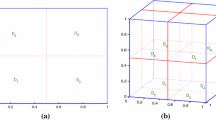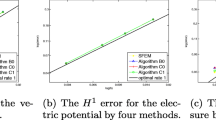Abstract
Based on local algorithms, some parallel finite element (FE) iterative methods for stationary incompressible magnetohydrodynamics (MHD) are presented. These approaches are on account of two-grid skill include two major phases: find the FE solution by solving the nonlinear system on a globally coarse mesh to seize the low frequency component of the solution, and then locally solve linearized residual subproblems by one of three iterations (Stokes-type, Newton, and Oseen-type) on subdomains with fine grid in parallel to approximate the high frequency component. Optimal error estimates with regard to two mesh sizes and iterative steps of the proposed algorithms are given. Some numerical examples are implemented to verify the algorithm.
Similar content being viewed by others
References
GUNZBURGER, M. D., MEIR, A. J., and Peterson, J. S. On the existence, uniqueness, and finite element approximation of solutions of the equations of stationary, incompressible magnetohydrodynamics. Mathematics of Computation, 56(194), 523–563 (1991)
SCHÖTZAU, D. Mixed finite element methods for stationary incompressible magnetohydrodynamics. Numerische Mathematik, 96(4), 771–800 (2004)
BADIA, S., CODINA, R., and PLANAS, R. Analysis of an unconditionally convergent stabilized finite element formulation for incompressible magnetohydrodynamics. Archives of Computational Methods in Engineering, 22(4), 621–636 (2015)
HE, Y. N. Unconditional convergence of the Euler semi-implicit scheme for the 3D incompressible MHD equations. IMA Journal of Numerical Analysis, 35(8), 767–801 (2015)
PROHL, A. Convergent finite element discretizations of the nonstationary incompressible magnetohydrodynamics system. ESAIM Mathematical Modelling and Numerical Analysis, 42(6), 1065–1087 (2008)
DONG, X. J., HE, Y. N., and ZHANG, Y. Convergence analysis of three finite element iterative methods for the 2D/3D stationary incompressible magnetohydrodynamics. Computer Methods in Applied Mechanics and Engineering, 276, 287–311 (2014)
LAYTON, W. J., MEIR, A. J., and SCHMIDT, P. G. A two-level discretization method for the stationary MHD equations. Electronic Transactions on Numerical Analysis, 6, 198–210 (1997)
DONG, X. J. and HE, Y. N. Convergence of some finite element iterative methods related to different Reynolds numbers for the 2D/3D stationary incompressible magnetohydrodynamics. Science China Mathematics, 59(3), 589–608 (2016)
XU, J. C. and ZHOU, A. H. Local and parallel finite element algorithms based on two-grid discretizations. Mathematics of Computation, 69(231), 881–909 (2000)
XU, J. C. and ZHOU, A. H. Local and parallel finite element algorithms based on two-grid discretizations for nonlinear problems. Advances in Computational Mathematics, 14(4), 293–327 (2001)
YU, J. P., SHI, F., and ZHENG, H. B. Local and parallel finite element algorithms based on the partition of unity for the Stokes problem. SIAM Journal on Scientific Computing, 36(5), 547–567 (2014)
SHANG, Y. Q. and LUO, Z. D. A parallel two-level finite element method for the Navier-Stokes equations. Applied Mathematics and Mechanics (English Edition), 31 (11), 1429–1438 (2010) https://doi.org/10.1007/s10483-010-1373-7
HE, Y. N., XU, J. C., and ZHOU, A. H. Local and parallel finite element algorithms for the Navier-Stokes problem. Journal of Computational Mathematics, 24(3), 227–238 (2006)
TANG, Q. L. and HUANG, Y. Q. Local and parallel finite element algorithm based on Oseen-type iteration for the stationary incompressible MHD flow. Journal of Scientific Computing, 70(1), 149–174 (2017)
DONG, X. J., HE, Y. N., WEI, H. B., and ZHANG, Y. H. Local and parallel finite element algorithm based on the partition of unity method for the incompressible MHD flow. Advances in Computational Mathematics, 44(4), 1295–1319 (2018)
SHANG, Y. Q., HE, Y. N., KIM, D. W., and ZHOU, X. J. A new parallel finite element algorithm for the stationary Navier-Stokes equations. Finite Elements in Analysis and Design, 47(11), 1262–1279 (2011)
SERMANE, M. and TEMAM, R. Some mathematics questions related to the MHD equations. Computer Compacts, 1(4), 212–212 (1983)
ARNOLD, D. N., BREZZI, F., and FORTIN, M. A stable finite element for the Stokes equations. Calcolo, 21 (4), 337–344 (1984)
HEYWOOD, J. and RANNACHER, R. Finite element approximation of the nonstationary Navier-Stokes problem I: regularity of solutions and second-order error estimates for spatial discretization. SIAM Journal on Numerical Analysis, 19(2), 275–311 (1982)
HE, Y. N., MEI, L. Q., SHANG, Y. Q., and CUI, J. Newton iterative parallel finite element algorithm for the steady Navier-Stokes equations. Journal of Scientific Computing, 44(1), 92–106 (2010)
GREIF, C., LI, D., SCHÖTZAU, D., and WEI, X. X. A mixed finite element method with exactly divergence-free velocities for incompressible magnetohydrodynamics. Computer Methods in Applied Mechanics and Engineering, 199(45–48), 2840–2855 (2010)
Acknowledgements
The authors would like to thank the editors and referees for their helpful suggestions.
Funding
Project supported by the National Natural Science Foundation of China (Nos. 11971410 and 12071404), the Natural Science Foundation of Hunan Province of China (No. 2019JJ40279), the Excellent Youth Program of Scientific Research Project of Hunan Provincial Department of Education (Nos. 18B064 and 20B564), the China Postdoctoral Science Foundation (Nos. 2018T110073 and 2018M631402), and the International Scientific and Technological Innovation Cooperation Base of Hunan Province for Computational Science (No. 2018WK4006)
Author information
Authors and Affiliations
Corresponding author
Additional information
Citation: TANG, Q. L. and HUANG, Y. Q. Parallel finite element computation of incompressible magnetohydrodynamics based on three iterations. Applied Mathematics and Mechanics (English Edition), 43(1), 141–154 (2022) https://doi.org/10.1007/s10483-022-2802-7
Project supported by the National Natural Science Foundation of China (Nos. 11971410 and 12071404), the Natural Science Foundation of Hunan Province of China (No. 2019JJ40279), the Excellent Youth Program of Scientific Research Project of Hunan Provincial Department of Education (Nos. 18B064 and 20B564), the China Postdoctoral Science Foundation (Nos. 2018T110073 and 2018M631402), and the International Scientific and Technological Innovation Cooperation Base of Hunan Province for Computational Science (No. 2018WK4006)
Rights and permissions
About this article
Cite this article
Tang, Q., Huang, Y. Parallel finite element computation of incompressible magnetohydrodynamics based on three iterations. Appl. Math. Mech.-Engl. Ed. 43, 141–154 (2022). https://doi.org/10.1007/s10483-022-2802-7
Received:
Revised:
Published:
Issue Date:
DOI: https://doi.org/10.1007/s10483-022-2802-7
Key words
- local and parallel algorithm
- finite element (FE) method
- iteration
- stationary incompressible magnetohydrodynamics (MHD)




